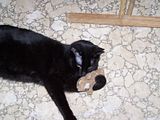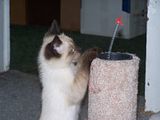Lizzielou the last I checked you were swamping the Dog House with pro-Kerry links. Why is Christa not allowed the same privilege. You say things could get nasty. I have news for you - they already have and much of the mud slinging has come from you. If you can't take it, don't dish it out.






 Reply With Quote
Reply With Quote
















Bookmarks